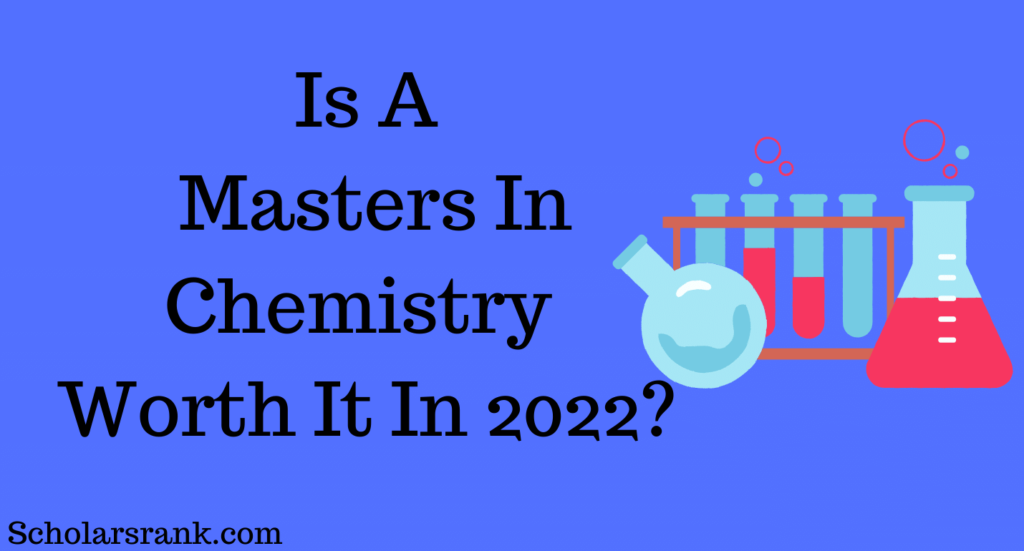Introduction
Is a masters in chemistry worth it? The scientific study of compounds and elements, including their molecular makeup, characteristics, behavior, and reactions when they come into contact with other substances, is known as chemistry. The study of chemistry requires extensive investigation. A master’s degree in chemistry can increase your career alternatives and make you eligible for executive positions and highly sought-after specialties. This can increase your income potential and put you at the forefront of an industry rife with innovation.
Engineering, medical science, pharmacology, environmental science, food science, and many other professions are all open to those with master’s degrees in chemistry. Additionally, you could work in a variety of settings, including government, commercial businesses, corporate R&D departments, and academic institutions, as chemistry is a crucial discipline in so many different professional fields. You can find yourself in high demand for a variety of intriguing possibilities as a master in chemistry.
What Is A Masters In Chemistry?
A master’s degree in chemistry is equivalent to a doctorate in the field of chemistry, which is the study of the composition, structure, and properties of substances. With the help of this degree, you can further your understanding of chemical principles by building on the abilities and knowledge you acquired throughout your undergraduate studies. You might graduate with a Master of Arts (MA) or Master of Science (MS) in chemistry, depending on the institution or program you pick.
With one major exception, the curriculum for both degrees is often the same. If you wish to pursue a career in practical chemistry, you probably need to finish a thesis project in a lab to receive a Master’s Degree. An MA in chemistry is primarily designed for students interested in careers outside of the lab and frequently includes a research paper or comprehensive test.
Common Subjects Covered In A Master In Chemistry Program
In most master’s programs in chemistry, there are courses in topics like materials and polymers, surface science, nanoscience, photonics, and medicinal chemistry, to mention a few. Chemistry is a large field. Additionally, you can have the chance to specialize, which aids in your preparation and development of the abilities required for your career objectives. For instance, popular subject areas for students to concentrate on are:
- Analytical Chemistry
To comprehend the structure and composition of the matter better, it combines chemistry, statistics, computers, and instrumentation.
- Biochemistry
Uses scientific knowledge and methods to get a deeper understanding of the molecular-level chemical processes that occur within and are related to living things. Focus areas include cell communication, the relationship between molecular structure and function, and what transpires inside various cell types.
- Forensic chemistry
Uses analytical techniques on samples and data collected during a criminal investigation. Toxicology, microscopy, spot testing, separation analyses, and mass spectrometry are among the techniques used.
- Environmental chemistry
Is a field of study that focuses on the effects of chemicals on the environment. Additionally, it evaluates long-term threats to ecosystems and human health and keeps track of how human activity is affecting the environment.
- Nutritional science
Investigates the effects of nutrients, foods, and other substances on the bodies of humans and animals, biochemical processing, and the connection between nutrition and both disease and health.
- Physical chemistry
Analyzes the physics of chemical reactions, including how matter behaves, how chemical reactions function, and the significance of the physical characteristics of molecules and atoms.
- Chemical engineering
Produces and manufactures things using chemical processes. Chemicals, food, medications, fuel, and other items may be included.
- Organic chemistry
Examines the characteristics, processes, content, and structure of carbon-containing compounds, such as those found in living things and a wide range of man-made products, such as plastics, detergents, cosmetics, and fuels.
How Can I Meet the Requirements for a Chemistry Master’s Degree?
There is no formal entrance exam for admission to a master’s degree in chemistry, but some may demand that you pass the Graduate Record Examination (GRE). If the GRE is necessary, your program might ask for either the general exam or the chemistry-specific GRE. While some schools might only require you to pass the exam, others can set a minimum score requirement. These specifications will differ amongst chemistry master’s programs.
The fundamental prerequisite for admission to a chemistry master’s program, if the GRE is not required, is the successful completion of a bachelor’s degree from a suitably authorized undergraduate institution. The majority of regionally accredited graduate schools will demand that your bachelor’s degree be awarded by a regionally accredited institution or university, even though programmatic accreditation is not particularly necessary in this discipline. It’s also important to keep in mind that your undergraduate and graduate degrees must have been obtained from a program that has been accredited by the Accreditation Board for Engineering and Technology (ABET), Inc. if you intend to use your chemistry master’s degree to pursue a career as a Professional Engineer (PE).
Some universities may offer combined bachelor’s and master’s degree programs, allowing you to complete both levels of education in a single, five-year program. If you already know that you’ll be pursuing your postgraduate degree, choosing this option could save you time and money. However, the rapid speed of such a curriculum might make it difficult to complete both degrees in this manner. Find out if your school provides this bundle option and inquire as to the requirements. But make sure you can handle the new task!
Refer to your planned program and learn more about the application requirements and any other requirements, such as work experience, academic performance standards, and referrals, if you have any more inquiries about eligibility.
Which Advanced Chemistry Degrees Are Available?
Although a bachelor’s degree is the minimum need for many professions in the chemical industry, getting an advanced degree is probably necessary if you want to stand out from the competition and grow in your position. A master’s degree might be sufficient depending on your career goals, but a position in postsecondary education or research would probably also require you to obtain your doctorate. As you consider your career aspirations, take into account the following advanced degrees:
Master of Chemistry (MA or MS)
Depending on the curriculum and area of focus, it may take two or three years and 30-45 credits to acquire a master’s degree in chemistry. You will delve deeply into the cutting-edge subject matter in a master’s degree and focus on a particular area of studies, such as neurochemistry, biochemistry, organic chemistry, or pharmaceutical chemistry. Some programs provide numerous specialties and the majority call for a research project or thesis in addition to some sort of lab or practical experience. You are eligible for advanced and well-paying positions in professions like chemical engineering, biochemist, food scientist, agricultural scientist, and materials scientist with a master’s in chemistry.
Ph.D. in Chemistry
The greatest level of education you may obtain in chemistry is a Ph.D. The education for this terminal degree, which includes advanced courses, a research project and dissertation, comprehensive tests, and lab or instructional work, normally takes three to five years to complete. You will be well into your field of specialization at this level. As a result, you might need to choose where to pursue your doctorate based on how each school compares to your field of study. With a Ph.D., you’ll be eligible for a wide range of advanced positions, such as biochemist, director of research, or postsecondary teacher.
Is a Master’s in Chemistry Worth It?
According to the Bureau of Labor Statistics, if you obtain an advanced degree in chemistry, your wages will probably be greater. The typical annual wage for chemists and materials scientists with a bachelor’s degree is $60,000, while that figure may be as high as $71,000 for those with a master’s degree, according to the BLS. One reason is that you may be eligible for a range of leadership positions and specialties with your advanced degree, which could ultimately enhance your career trajectory and raise your earning potential.
Career Options For A Master In Chemistry
You can find employment in a range of fields, such as research, healthcare, and manufacturing, with a master’s degree in chemistry. There are numerous careers that you can think about pursuing if you are a recent graduate or are pursuing your master’s degree. You might find your next employment by investigating potential career routes and finding out more about these roles, including the typical responsibilities for each post.
You can decide to undertake research in a lab or institution. Your master’s in chemistry may also equip you for a surprise profession as a paint developer who develops new colors or a brewer who evaluates the quality of their products. With this degree, you could pursue a wide range of careers, such as the ones listed below:
- Quality Control Analyst
As a quality control analyst, you’ll analyze various items to see if they adhere to quality standards and other criteria, such as legal or commercial requirements. You might work in the manufacturing sector for pharmaceuticals, medical devices, or other products. Researching, evaluating substances and products, and summarizing your findings in reports are typical tasks.
- Brewer
A brewer is a qualified individual who manages the brewing procedure in the food sector. They may evaluate the materials, design new products, and guarantee product quality. To carefully choose ingredients, carry out the fermentation process, and package the goods, they may apply scientific expertise. Their responsibilities in small breweries may also include marketing and delivering brewery products.
- Medical Laboratory Technologist
An expert who works in a medical lab for a hospital, pharmaceutical company, or research institution is a medical lab technologist, also known as a clinical lab technician. They frequently have to run experiments, gather data, and analyze the outcomes. They might also produce research papers and work with other medical experts to develop drugs, test methods, or medical items.
- Chemical Engineer
In this position, you will create, improve, and test various chemical-related products and systems. Many chemical engineers decide to focus on industries like medicines or transportation. Others assist in resolving issues relating to the usage of chemicals by working with diverse industries. Common activities include developing safety protocols for working with chemicals, devising tools and processes, testing protection measures, and predicting production costs.
- Research Chemist
In this position, you will research various chemicals and examine their interactions. To support your conclusions, you might conduct experiments and tests, track the outcomes, and produce reports. You might work together with entrepreneurs and production teams to test new items and share the results.
- Technical Writer
Instruction manuals, user guides, and scientific articles are all produced by technical writers. They frequently focus on a certain technical area, like chemistry. This enables them to write clearly and simply about difficult subjects. Researching, writing, formatting, and revising their text before publishing is some of their responsibilities.
- Chemistry Instructor
While the majority of four-year institutions exclusively employ professors with doctoral degrees, it is usual for community and junior colleges to just demand a Master’s degree for their teaching members. At this level, courses like general chemistry and organic chemistry are typically offered. Another duty of chemistry professors is to supervise the activities of the chemistry labs, which involves keeping an eye on student security, placing supply orders, and keeping the labs clean. This profession may be for you if you like explaining concepts to large groups of people, are kind and patient, have good communication skills, and desire to shape students’ ideas.
- Food Technologist
A food technologist, often known as a food scientist, works in the food sector and develops new food items. They do research on food products and ingredients, develop food production techniques, and assist businesses in producing safe and wholesome food for consumers. Additionally, they could conduct quality checks or develop standards for food labeling and packaging.
- Environmental Scientist
In this position, you’ll frequently gather samples, carry out research investigations, create reports, and analyze data on the environment. You might also work on activities like creating plans to handle or avoid environmental problems. Additionally, you could advise organizations, the general public, and the government on potential ecological effects, risks, and health issues.
- Product Development Scientist
A production development scientist creates new products for a range of industries, including pharmaceuticals, medical items, and food, using scientific research and mathematical reasoning. They may have to do production method research, evaluate the safety and productivity of the production process, and create new product designs.
Masters In Chemistry Vs Masters In Biotechnology
I’m not contrasting the two fields; rather, I’m outlining their advantages so you may choose the one that interests you.
| Masters in Chemistry | Masters in biotechnology |
| Those who are prepared to enter higher education teaching sectors in both private and public universities should opt for a master’s in chemistry. The course is also open to those who plan to pursue additional research after receiving their master’s degree. They must be capable of analytical thinking and problem-solving skills including analyzing and interpreting data and making judgments based on scant information. Being organized and managing one’s time well are essential skills for designing and carrying out experiments. Assimilation of scientific theories and arguments for discussion and debate, as well as communicating your research findings via written reports and oral presentations to various audiences, are all examples of skills in written and spoken communication that they should possess. | In this course, communication skills are of utmost importance. This course helps to have abilities in manufacturing and production, fundamental laboratory techniques, caring for research plants or animals, and greenhouse/growth chambers. Students should be able to comprehend the protocols needed for their jobs as well as the technical jargon specific to their occupations. They should be able to operate independently, be computer literate, and possess many problem-solving and information technology capabilities, as well as analytical and interpreting abilities. |
Benefits
| Masters in Chemistry | Masters in biotechnology |
| The degree program provides a strong foundation for higher degree programs in the relevant fields, such as M.Phil. & Ph.D. programs for research work. Graduates may work in industries including the food and beverage sector, utilities and energy research, or health and medical organizations. Candidates can also choose to work for institutions and organizations dedicated to scientific research. They can then go on to become teachers at the secondary school level, and after passing the NET exam, they can apply for permanent positions in colleges and universities. The best candidates for this course are those who are interested in an MSc in Chemistry, enjoy lab work and are capable of handling experiments. | The planning, production, and management of the bioprocessing industries are all sectors where biotechnologists can find work. Biotechnology is a field that is expanding quickly and has a bright future. Pharmaceutical firms, food manufacturing, and processing businesses, publicly financed research facilities, chemical, agricultural, environment control, waste management, energy, and related industries all provide biotechnology opportunities. Candidates can pursue a fascinating career as a Research Associate, which enables them to conduct studies while being guided by seasoned Scientists. The range of biotechnology jobs includes those in many different industries, including research, sales, marketing, administration, quality control, breeders, and technical support, among others. |
Job Types
| Masters in Chemistry | Masters in biotechnology |
| Quality Control Analyst Environmental Scientist Product Development Scientist Food Technologist Chemistry Instructor Brewer Medical Laboratory Technologist Chemical Engineer Research Chemist Technical Writer | Lab Technician Marketing Manager Engineer (Chemical, Electrical, Environmental, and Industrial) Environmental or Safety Specialist Medical Representative Quality Control Officer Analyst (Venture-Capitalist) Business Development Manager |
Conclusion
Is a masters in chemistry worth it? It is worthwhile to pursue a master’s degree in chemistry because it will help you enhance your profession. With a master’s in chemistry, you can accomplish a lot. Consider your options if you’re not sure if this is the best graduate degree for you. Examine whether developing your chemistry knowledge can help you achieve your job objectives and passions.
If you’re still trying to decide which path you want to go in, look about the area to see what strikes a chord. Spend some time researching various chemistry topics to discover your area of interest and the course you want to pursue your master’s in chemistry and profession.
Frequently Asked Questions (FAQs)
What Qualifications Must One Meet Enroll In The Msc Chemistry Program?
- Candidates must hold a bachelor’s degree in Chemistry from a college or university that is accredited. They must graduate with an overall grade point average of at least 50%.
What Opportunities Exist For A Job After Receiving A Master Degree in Chemistry?
- Candidates who have pursued a degree in MSc Chemistry have a lot of options. As a professor or teacher, they can choose to work in education. They may also work for pharmaceutical firms, research institutes, hospitals, medical schools, private clinics, etc.
What Are Some Of The Fields Where Postgraduates In Chemistry Are Sought After?
- The likelihood of hiring MSc Chemistry graduates at pharmaceutical firms, research facilities, laboratories, medical schools, etc.
You can also read, “Is A Masters In Biomedical Science Worth It In 2022?“








